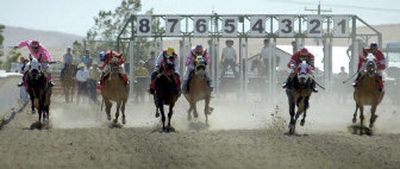Cloned mules bested in pro race by natural runners

WINNEMUCCA, Nev. – Nature triumphed over nurture as two cloned mule brothers came up short in a professional race against traditionally bred runners.
Idaho Gem, the world’s first equine clone, finished third and Idaho Star wound up seventh in an eight-way race Sunday at the 20th-annual Winnemucca Mule Races, Show & Draft Horse Challenge.
Idaho Gem covered his 350-yard sprint in 21.246 seconds – two-and-a-half lengths behind the winner, Bar JF Hot Ticket, which finished in 20.866 seconds. Idaho Star checked in at 22.181 seconds.
“I think both animals, especially Idaho Gem, showed they have a lot of upside,” said Don Jacklin, a Post Falls businessman who helped finance the cloning project. “They both proved they could compete.”
The clones, competing for an $8,500 purse in the finals of their bracket, won their qualifying heats Saturday in what was billed as the first professional competition between clones of any kind.
A crowd of 1,000 cheered as the mules raced down the stretch of an oval track in Winnemucca, about 160 miles northeast of Reno.
Winnemucca was the first stop on a professional mule-racing circuit that will shift to county fairs in California through the summer.
Researchers on the cloning team hailed the clones’ athletic performance and the project’s benefits to human cancer research.
“Their performance is one thing that will make people feel warm and fuzzy about cloning,” said Kenneth White, a Utah State University professor who conducted the cloning.
A mule is the usually sterile offspring of a donkey father and a horse mother. The clones were born three years ago and carry identical DNA taken from a fetus produced by the same parents that sired a champion mule racer.
Wayne Pacelle, president of the Humane Society of the United States, criticized the project.
“There’s no shortage of horses and mules,” Pacelle said.
“Why do we have to subject them to the risks associated with cloning? There’s no legitimate purpose for this exercise.”